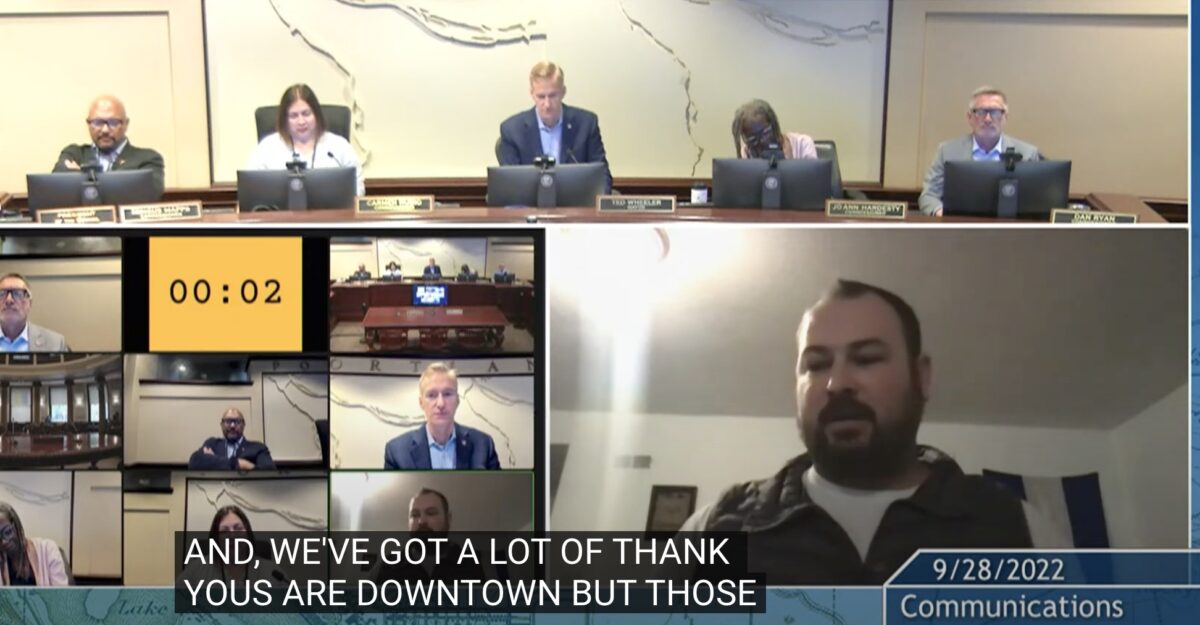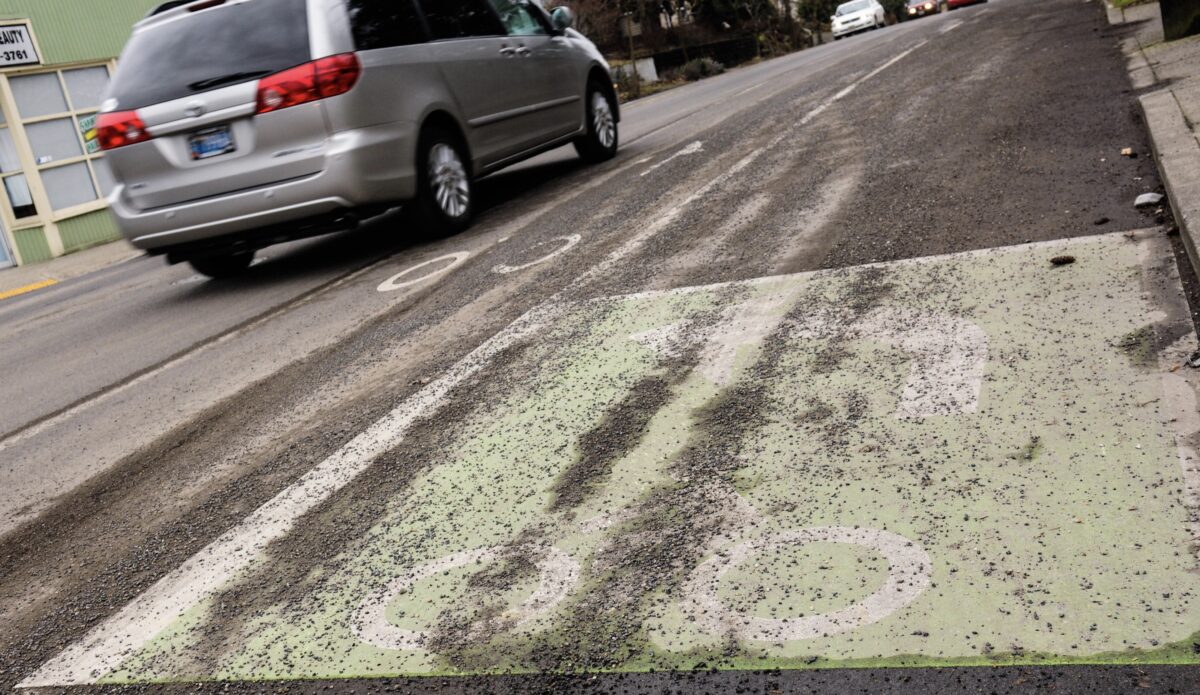
“We get a lot of thank yous from downtown, but those thank yous dry up when we ask for more money, and we’re suffering.”
-Andrew Sterling, PBOT and Laborers Local 483
The people who work in the Portland Bureau of Transportation’s Maintenance Operations department do the nitty-gritty work of keeping this city moving — and their work is especially valued by those who rely on clean bike lanes and bright crosswalk stripes for their safety.
Their work is inherently laborious, but maintenance staff used to feel like it was worth it. The city benefits were good, yes – but employees also found a sense of satisfaction and pride in their work. But now, as staff shortages force employees to work excessive hours of overtime without reaping the same benefits or competitive hourly wages public employees used to receive, they’re calling on the city to repair their relationship or face a serious crisis.
As PBOT leaders often remind us, the agency has been dealing with a multi-billion dollar maintenance backlog for decades, which they hoped to finally get a handle on with a 10-cent local gas tax in 2016. Portlanders voted in favor of the gas tax again in 2020, but the extra funding hasn’t been the maintenance game-changer it was meant to be. And the lack of upkeep is showing.
As we’ve pointed out, this situation is frustrating for people who bike and walk in this city. Nobody likes riding on greenways full of bumps and potholes or bike lanes littered with glass, trash or leaves. (A recent Bike Loud PDX policy ride with PBOT Maintenance Operations manager Jody Yates provided an insightful look into the importance of street and bikeway maintenance.)
Maintenance staffers are aware of community gripes, but claim they don’t have the resources to fix them.
Deteriorating working conditions reveal cracks in the pavement
Andrew Sterling is a PBOT traffic crew leader and the Vice President of Laborers Local 483, the union that represents PBOT maintenance staff. Yesterday, he took employee concerns to the public stage when he addressed City Council to ask for their help to negotiate improved working conditions.
While Sterling’s main job description concerns doing things like striping bike lanes and maintaining crosswalks, staff shortages and recent emergency weather events (like the April snow storm) have interfered with day-to-day operations. In order to get it all done, crew members have to put in a lot of overtime.
“We worked entirely through Covid, in person, on-site every day,” Sterling said. “Many of my coworkers and myself work 70 to 80 hours a week during weather emergencies. Then we have to pick up where we left off for maintenance operations.”
Sterling said these conditions have made it difficult for the maintenance division to retain and recruit employees. He said people working in this department in the city are making less money than they would if they worked in the private sector, and they aren’t seeing the kinds of benefits city employment used to bring.
“Our retirement has been defunded. Our benefits have been in decline in the last 15 years,” Sterling said. “What I’m asking of you today is to support us and our day-to-day operations. We get a lot of thank yous from downtown, but those thank yous dry up when we ask for more money, and we’re suffering.”
“The city is responsive to crisis, and our folks are willing to make themselves a crisis.”
-James O’Laughlen, Laborers Local 483
In response, PBOT commissioner Jo Ann Hardesty issued words of thanks, but didn’t make any promises about changing the situation for these employees.
“Folks who work for maintenance have been in the lead on many of the crises this community has experienced over the last few years,” Hardesty said. “I just want you to know that your commissioner in charge absolutely appreciates the work that you do every single day with the limited resources we have. I also know it’s not your fault we have a $4 million [sic – it’s actually “billion”] maintenance backlog.”
James O’Laughlen, Field Representative & Organizer for Local 483, told BikePortland that the city’s transportation system is suffering as a result of these problems. If something doesn’t change soon, this backlog will only get worse.
“Having so much emergency work without the necessary workers crowds out the infrastructure improvements we’re all focused on, from achieving Vision Zero to meaningful ADA compliance on our sidewalks,” O’Laughlen said on a phone call this morning. “This work only happens because people go above and beyond. They show up for voluntary overtime because they know if they don’t, the backlog is going to grow and grow.”
Employees are keeping their options on the table
Union members have been involved in contract discussions with the city since March, and although their old contract expired at the end of June, they haven’t yet come to an agreement on the terms of the new one.
O’Laughlen told BikePortland the two main things they’re looking for in the new contract are wages and safety. They want to bring back the working standard public employees used to be able to count on that made arduous public sector jobs competitive.
“What we need for our members is to create an environment where people aren’t aggressively overworked, where they are protected from conditions that have been deteriorating and getting compensation for it,” O’Laughlen said on a phone call today. “It’s hard to recruit and it’s hard to retain in a low-morale environment. It’s hard to perform the work.”
If Local 483 and the city can’t come to an agreement soon, the next step will be to bring in a mediator. If they don’t work out a deal after that, there’s potential for a strike after a cooling-off period.
“There’s a reticence to do it, but our members have communicated strongly that they’re willing to go that far. It’s based on wanting to perform this public service work.” O’Laughlen said. “They know that that the city is responsive to crisis, and our folks are willing to make themselves a crisis.”
Update: While we didn’t hear back from the Portland Bureau of Transportation by press time for this story, we later received this comment from Public Information Officer Dylan Rivera:
“We cannot comment on on-going contract negotiations. PBOT leadership supports the work of our Maintenance Operations Group, who are essential responders for the entire city when it comes to emergency response to winter weather, the COVID-19 pandemic and other emergencies. Year-round, their work is critical to providing the safe access for biking, walking and other modes of travel for our community and we will continue to work with our labor partners to make sure the City of Portland can attract and retain top talent across all areas of the bureau.”



